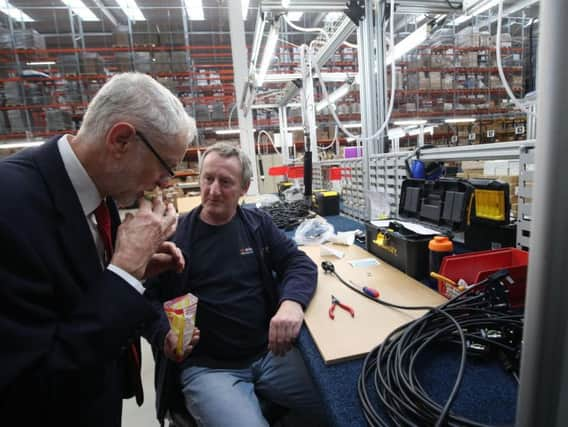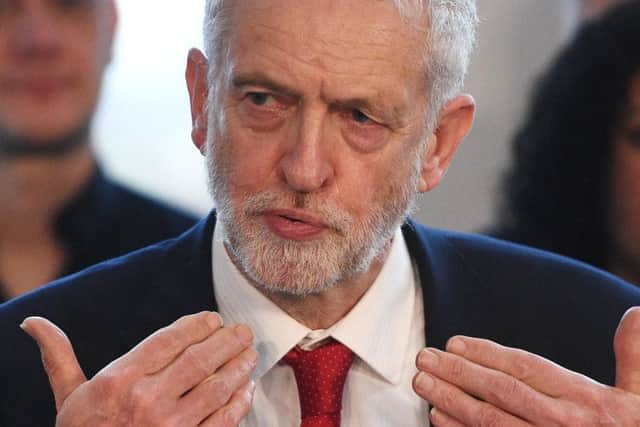Jeremy Corbyn says his pro-Brexit stance won't alienate Labour's Remain voters in key Yorkshire marginal seats


Mr Corbyn today used a speech in Wakefield to call for a General Election if Theresa May's Brexit deal is defeated in the Commons, but admitted for the first time that this could result in the UK's Brexit date of March 29 being delayed.
He then went onto Guiseley, in the Pudsey constituency where Labour's left-wing candidate Jane Aitchison is hoping to overturn the razor-thin majority of 331 held by Conservative Stuart Andrew.
Advertisement
Hide AdAdvertisement
Hide AdAnd he was later due to visit the Morley and Outwood constituency, where sitting Tory Andrea Jenkyns will defend a majority of 2,104 against Labour's Deanne Fergusson.


Yesterday a survey of 2,000 people in Yorkshire by YouGov, commissioned by the People's Vote, suggested that declining support among Remainers meant Labour may slip behind the Conservatives as the region's biggest party.
But speaking to The Yorkshire Post, Mr Corbyn dismissed the suggestion that Remain voters in his party, which represent around three-quarters of the total, would be put off by his pro-Brexit position.
Advertisement
Hide AdAdvertisement
Hide AdHe said: "No, not at all. We have set out very clearly the issues of poverty and injustice in this country and I set out this morning in my speech in Wakefield about the demands we are making on the Government, which is about to take us into either a no deal or a very bad deal situation.
"We will vote against both of those and say they have got to negotiate something better, which is a customs union with the EU, which I set out in my speech in Coventry last year.
"It is also what we then put into a General Election. Our conference motion, carried unanimously, included a sequencing of events, opposing the Government's deal, calling for a General Election and then after that go into that General Election campaign, and our party policy will be decided in advance of the General Election."
Asked if there was a risk that a General Election would result in the Government still not having a majority to deliver Brexit, he said: "We will fight the election as the Labour Party, we will hope to govern as the Labour Party and we will govern as a Labour government. We will put our policies to the people that way."
Advertisement
Hide AdAdvertisement
Hide AdMs Aitchison added: "I am very confident here. Stuart Andrew is the Conservative MP, he has already said he is going to vote for Theresa's deal next week.
"Now whether people in this constituency voted leave or remain, none of them voted for that. I am very confident about our stance compared to theirs."
Earlier, Mr Corbyn said, the UK's Brexit date of March 29 could be delayed if Labour forces a general election.
Advertisement
Hide AdAdvertisement
Hide AdHe dismissed the Government's offer to consider new safeguards for workers as part of the Brexit package, backing a trade union assessment that "it simply doesn't guarantee the protections that we are seeking".
Mr Corbyn confirmed that Labour would go into any early election on a platform of opening new negotiations with Brussels on a Brexit deal involving a customs union, single market relationship and a guarantee to keep pace with EU rights and standards.
And he said that "time" would be needed to complete these talks.
Mr Corbyn said there was "no split" between him and shadow Brexit secretary Sir Keir Starmer, who suggested on Wednesday that an extension of the two-year period for negotiations set out in Article 50 of the EU treaties may now be "inevitable".
Advertisement
Hide AdAdvertisement
Hide AdAsked if he agreed, the Labour leader said: "Quite clearly, moving into office at a period right up against the clock, there would need to be time for that negotiation.
"What Keir was doing was reflecting the practicalities of how that negotiation would be undertaken ... An extension would be a possibility because clearly there would have to be time to negotiate."